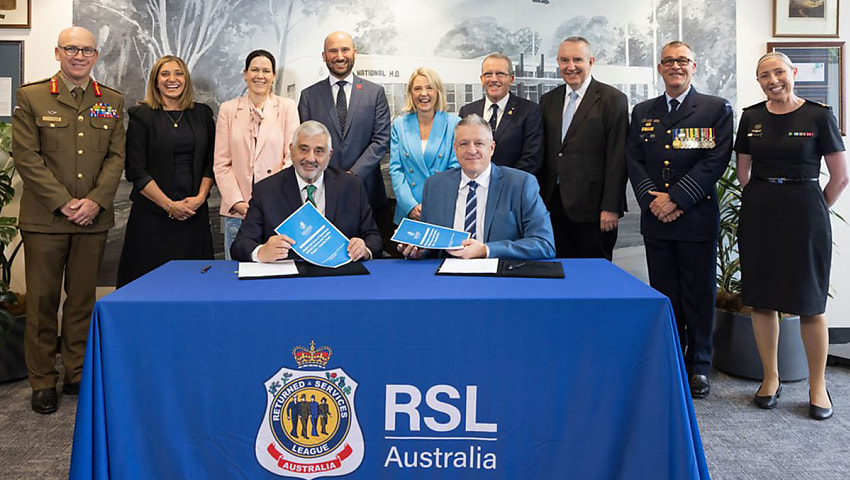The Returned & Services League of Australia (RSL Australia) has launched a major initiative to research the impacts on veterans and their families as a result of Australian Defence Force service since 2002, particularly in conflicts in the Middle East.
The project aims to identify and better understand the needs and concerns of contemporary veterans and their families and ensure that they are provided with the support and services they deserve, according to RSL Australia national president Greg Melick.
Melick said the RSL was leading the initiative in part as a response to the serious issues raised by the Royal Commission into Defence and Veteran Suicide.
“There have been several studies undertaken but no follow-up of these veterans for more than a decade. It is clear that a significant piece of research is needed to better understand how we can support today’s veterans and their families,” he said.
“The first phase of the project is the Middle East Area of Operations (MEAO) Scoping Study, which will lead into a much broader and ongoing study to examine and assess the issues and concerns identified in much greater detail.
“This broader study will recommend enhancements and national strategies to improve the range and level of services provided to today’s veterans and their families.”
The MEAO Scoping Study is being fully funded and led by the RSL. It is independent of government but is being supported by the Department of Veterans’ Affairs, the Department of Defence, and the Repatriation Commission. It will engage RSL state branches, RSL sub-branches and veterans Australia-wide.
The scoping study will be undertaken by an experienced, multidisciplinary consortium led by Gallipoli Medical Research (GMR), with Griffith University and the Queensland Centre for Mental Health Research (QCMHR).
The Gallipoli consortium was selected to conduct the study from a high-quality shortlist of four tenders.
It followed a multi-level independent assessment process based on proposed methodology, the experience and expertise of the researchers and the outcomes to be delivered.
Melick said the successful consortium had extensive experience and a track record of delivering large-scale multidisciplinary projects covering veteran mental and general health programs and impacts on veterans and their families.
The MEAO Scoping Study is expected to run over the first half of 2005, with the broader study to follow over two to three years, according to the RSL.
“It will look at the uniqueness of conflicts since 2002, review previous studies, and identify the specific physical and mental costs on the veteran community, including mild traumatic brain injury (mTBI) that need to be investigated in greater detail. It will also look at the impact on families, noting the difference to previous conflicts as there was never a sense that the nation was at war, as well as the legacy of the outcomes of the wars in Iraq and Afghanistan,” Melick said.
Gallipoli consortium lead Dr Camila Guindalini said the scoping study would address key research questions and focus on the long-term physical and mental health outcomes for Middle East veterans and their families.
“We will look at the specific health impacts of deployments on veterans involved in studies like Transition and Wellbeing Research Program (TWRP) and the Military Health Outcomes Program (MILHOP), the effects of deployment-related mTBI, how morally transgressive events have influenced veterans’ and their families’ health, and the factors from Middle East deployments contribute to veterans’ separation from the ADF,” Guindalini said.
Gallipoli Medical Research CEO Miriam Kent said the study would create opportunities to tangibly improve the health of veterans and their families.
“By examining the long-term physical, mental and social impacts of MEAO deployments, we will not only gain meaningful, evidence-based insights to inform future research but also have the opportunity to translate the findings into tailored support service frameworks,” Kent said.
Andrew Kefford PSM, deputy secretary for policy and programs at DVA, said: “The outcomes from this important initiative will address the growing concerns of veterans from the wars in Iraq, Afghanistan and other conflicts since 2002 and particularly the uniqueness of the Iraq and Afghanistan experiences. This is nothing less than our veterans and their families deserve.”
Repatriation commissioner Kahlil Fegan said: “The MEAO Study is an exciting project that will help us to better understand the unique effects of operational service on those veterans who, like me, served in the Middle East. I, like many of my fellow Afghanistan and Iraq veterans, believe there needs to be a closer examination of the impact of these conflicts, to help us avoid the ‘long shadow’ cast by the Vietnam War, where decades went by before anyone began seriously investigating what effect the war had had, and what it meant for meeting the needs of those veteran and their families.”
The Australian Defence Force’s Chief of Personnel, Lieutenant General Natasha Fox, said: “Studies aiming to improve the health and wellbeing of serving or former-serving Australian Defence Force personnel are welcomed by Defence.
“The recently released Defence Workforce Plan reinforces that optimising the health and wellbeing of the ADF is a priority that will increase national capability and improve life course outcomes for our people and their families.
“Studies like this have the potential to deliver findings that lead to targeted improvements for our people and their families who served in the Middle East Area of Operations.”
Melick said the RSL is confident the scoping study and the following broader study will be viewed as the most significant initiative undertaken by the league for decades, and the RSL Australia board sees it as a vital first step in enhancing the wellbeing of today’s veteran community.
“Following on from the outcome of the Royal Commission into Defence and Veteran Suicide, this work is imperative to ensure that Australia properly supports its veterans and their families and avoids the mistakes, neglect and omissions that occurred after the Vietnam War,” he said.



